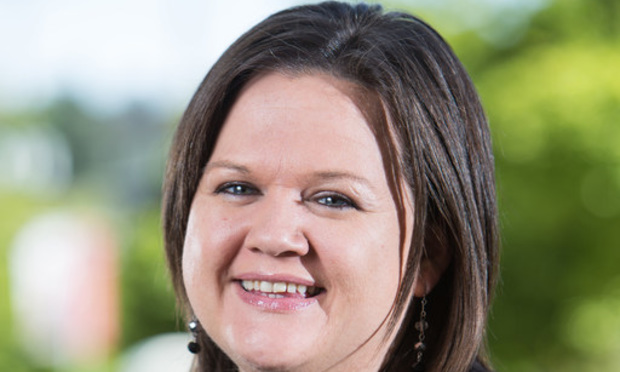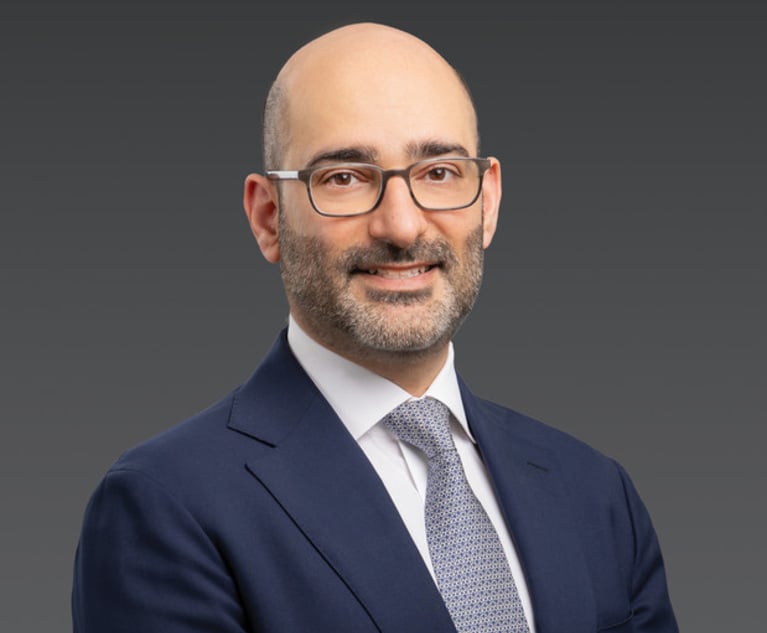Court Rules Ex-Inmate and Skadden Fellow Can Sit for Bar Exam
After a long legal battle, the Washington Supreme Court recently held that convicted felon Tarra Simmons has the "requisite moral character" to take the state's bar exam.
November 21, 2017 at 05:21 PM
13 minute read

Tarra Simmons will be allowed to sit for the Washington state bar exam following a decision late last week by the state's top court.
The Washington Supreme Court ruled unanimously on Nov. 16 that Simmons, a former nurse and convicted felon, could sit for the test, finding that the Seattle University School of Law graduate “has the requisite moral character and fitness to practice law in the State of Washington,” according to the ABA Journal.
Simmons' battle for the bar has been a hard-fought one.
She enrolled in law school in 2014 after a 20-month stint in prison for drug and theft convictions. Simmons, who did not return a request for comment this week, spoke with The American Lawyer earlier this year about her addiction to prescription drugs and amphetamines after the death of her father in 2010. A year later, she was charged and pleaded guilty to felony theft and drug possession and was sentenced to nearly two years in state prison.
After enrolling in law school in Seattle, Simmons was selected in December 2016 as one of 30 recipients of the prestigious Skadden Fellowship, an award funded by Skadden, Arps, Slate, Meagher & Flom that allows law school graduates to spend two years working on improving legal services for the poor. In her American Lawyer interview, Simmons said she planned to use her fellowship at the Seattle-based nonprofit Public Defender Association to help those with convictions overcome barriers to re-entering society.
However, Simmons' hopes for a legal career hit a snag in April when the Washington State Bar Association ruled against allowing her to take the bar exam. A month later, Simmons appealed that decision to the Washington Supreme Court.
Handling her appeal was Shon Hopwood, an associate professor at Georgetown University Law Center who like Simmons also happens to have once served time in prison.
Hopwood, whose stunning career trajectory was noted in October by CBS's “60 Minutes,” spent more than a decade in prison after being sentenced at 22 in 1999 for his involvement in several armed bank robberies. While in prison, Hopwood taught himself the law and became a de facto jailhouse lawyer for fellow inmates. On his release in 2008, he got a job in the legal field and was eventually accepted to the University of Washington School of Law.
After passing a character and fitness review by the Washington state judiciary, Hopwood passed the bar and received a federal clerkship in Washington, D.C., before landing a tenure-track professorship at Georgetown earlier this year.

Tarra Simmons will be allowed to sit for the Washington state bar exam following a decision late last week by the state's top court.
The Washington Supreme Court ruled unanimously on Nov. 16 that Simmons, a former nurse and convicted felon, could sit for the test, finding that the
Simmons' battle for the bar has been a hard-fought one.
She enrolled in law school in 2014 after a 20-month stint in prison for drug and theft convictions. Simmons, who did not return a request for comment this week, spoke with The American Lawyer earlier this year about her addiction to prescription drugs and amphetamines after the death of her father in 2010. A year later, she was charged and pleaded guilty to felony theft and drug possession and was sentenced to nearly two years in state prison.
After enrolling in law school in Seattle, Simmons was selected in December 2016 as one of 30 recipients of the prestigious Skadden Fellowship, an award funded by
However, Simmons' hopes for a legal career hit a snag in April when the Washington State Bar Association ruled against allowing her to take the bar exam. A month later, Simmons appealed that decision to the Washington Supreme Court.
Handling her appeal was Shon Hopwood, an associate professor at
Hopwood, whose stunning career trajectory was noted in October by CBS's “60 Minutes,” spent more than a decade in prison after being sentenced at 22 in 1999 for his involvement in several armed bank robberies. While in prison, Hopwood taught himself the law and became a de facto jailhouse lawyer for fellow inmates. On his release in 2008, he got a job in the legal field and was eventually accepted to the
After passing a character and fitness review by the Washington state judiciary, Hopwood passed the bar and received a federal clerkship in Washington, D.C., before landing a tenure-track professorship at Georgetown earlier this year.
This content has been archived. It is available through our partners, LexisNexis® and Bloomberg Law.
To view this content, please continue to their sites.
Not a Lexis Subscriber?
Subscribe Now
Not a Bloomberg Law Subscriber?
Subscribe Now
NOT FOR REPRINT
© 2025 ALM Global, LLC, All Rights Reserved. Request academic re-use from www.copyright.com. All other uses, submit a request to [email protected]. For more information visit Asset & Logo Licensing.
You Might Like
View All
Milbank’s Revenue and Profits Surge Following Demand Increases Across the Board
4 minute read
Fourth Quarter Growth in Demand and Worked Rates Coincided with Countercyclical Dip, New Report Indicates

'Translate Across Disciplines': Paul Hastings’ New Tech Transactions Leader

Orrick Picks Up 13-Lawyer Tech, VC Group From Gunderson Dettmer
Trending Stories
- 1'Shame on Us': Lawyer Hits Hard After Judge's Suicide
- 2Upholding the Integrity of the Rule of Law Amid Trump 2.0
- 3Connecticut Movers: New Laterals, Expanding Teams
- 4Eliminating Judicial Exceptions: The Promise of the Patent Eligibility Restoration Act
- 5AI in Legal: Disruptive Potential and Practical Realities
Who Got The Work
J. Brugh Lower of Gibbons has entered an appearance for industrial equipment supplier Devco Corporation in a pending trademark infringement lawsuit. The suit, accusing the defendant of selling knock-off Graco products, was filed Dec. 18 in New Jersey District Court by Rivkin Radler on behalf of Graco Inc. and Graco Minnesota. The case, assigned to U.S. District Judge Zahid N. Quraishi, is 3:24-cv-11294, Graco Inc. et al v. Devco Corporation.
Who Got The Work
Rebecca Maller-Stein and Kent A. Yalowitz of Arnold & Porter Kaye Scholer have entered their appearances for Hanaco Venture Capital and its executives, Lior Prosor and David Frankel, in a pending securities lawsuit. The action, filed on Dec. 24 in New York Southern District Court by Zell, Aron & Co. on behalf of Goldeneye Advisors, accuses the defendants of negligently and fraudulently managing the plaintiff's $1 million investment. The case, assigned to U.S. District Judge Vernon S. Broderick, is 1:24-cv-09918, Goldeneye Advisors, LLC v. Hanaco Venture Capital, Ltd. et al.
Who Got The Work
Attorneys from A&O Shearman has stepped in as defense counsel for Toronto-Dominion Bank and other defendants in a pending securities class action. The suit, filed Dec. 11 in New York Southern District Court by Bleichmar Fonti & Auld, accuses the defendants of concealing the bank's 'pervasive' deficiencies in regards to its compliance with the Bank Secrecy Act and the quality of its anti-money laundering controls. The case, assigned to U.S. District Judge Arun Subramanian, is 1:24-cv-09445, Gonzalez v. The Toronto-Dominion Bank et al.
Who Got The Work
Crown Castle International, a Pennsylvania company providing shared communications infrastructure, has turned to Luke D. Wolf of Gordon Rees Scully Mansukhani to fend off a pending breach-of-contract lawsuit. The court action, filed Nov. 25 in Michigan Eastern District Court by Hooper Hathaway PC on behalf of The Town Residences LLC, accuses Crown Castle of failing to transfer approximately $30,000 in utility payments from T-Mobile in breach of a roof-top lease and assignment agreement. The case, assigned to U.S. District Judge Susan K. Declercq, is 2:24-cv-13131, The Town Residences LLC v. T-Mobile US, Inc. et al.
Who Got The Work
Wilfred P. Coronato and Daniel M. Schwartz of McCarter & English have stepped in as defense counsel to Electrolux Home Products Inc. in a pending product liability lawsuit. The court action, filed Nov. 26 in New York Eastern District Court by Poulos Lopiccolo PC and Nagel Rice LLP on behalf of David Stern, alleges that the defendant's refrigerators’ drawers and shelving repeatedly break and fall apart within months after purchase. The case, assigned to U.S. District Judge Joan M. Azrack, is 2:24-cv-08204, Stern v. Electrolux Home Products, Inc.
Featured Firms
Law Offices of Gary Martin Hays & Associates, P.C.
(470) 294-1674
Law Offices of Mark E. Salomone
(857) 444-6468
Smith & Hassler
(713) 739-1250










